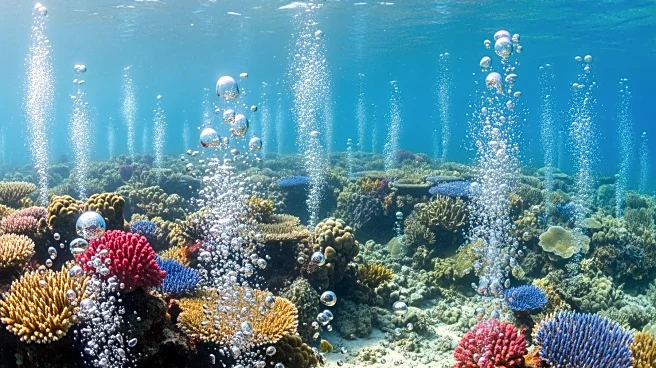What's Happening?
A recent study by the Alfred Wegener Institute (AWI) has provided insights into the Southern Ocean's ability to absorb carbon dioxide (CO2), contrary to previous climate model predictions. Despite global
warming, which was expected to weaken the Southern Ocean's capacity as a carbon sink, long-term measurements show that this ability has remained largely unchanged. The Southern Ocean accounts for approximately 40% of the CO2 absorbed by oceans globally, making it a critical component in slowing climate change. The study highlights the role of low-salinity surface water in trapping CO2 in the deep sea, preventing its release into the atmosphere. However, climate change is altering this balance, with strengthening westerly winds pushing CO2-rich deep water closer to the surface, potentially reducing the ocean's ability to absorb human-produced CO2.
Why It's Important?
The Southern Ocean's role as a major carbon sink is crucial in mitigating the effects of climate change. The study's findings suggest that while the ocean's capacity to absorb CO2 has not diminished, the ongoing changes in ocean circulation and water stratification could eventually impact this ability. If the stratification weakens, more CO2-rich deep water could reach the surface, reducing the ocean's capacity to absorb anthropogenic CO2 and exacerbating climate change. This research underscores the importance of understanding oceanic processes and their interactions with climate change, which could inform future climate models and policy decisions.
What's Next?
The study indicates a need for further research to confirm whether more CO2 has been released from the deep ocean in recent years. The Alfred Wegener Institute plans to examine these processes as part of the international Antarctica InSync program, aiming to gain a better understanding of the effects of climate change on the Southern Ocean. This research could provide valuable data to refine climate models and inform global climate policy.
Beyond the Headlines
The study highlights the complexity of oceanic processes and their impact on climate change. It suggests that focusing solely on surface observations may overlook critical interactions occurring beneath the ocean's surface. This deeper understanding could lead to more accurate climate predictions and strategies to enhance the ocean's role in carbon absorption.










